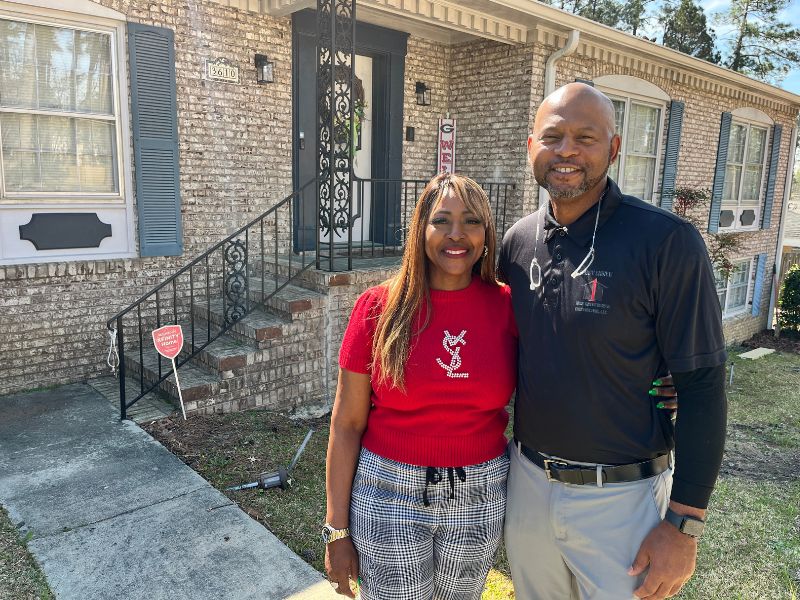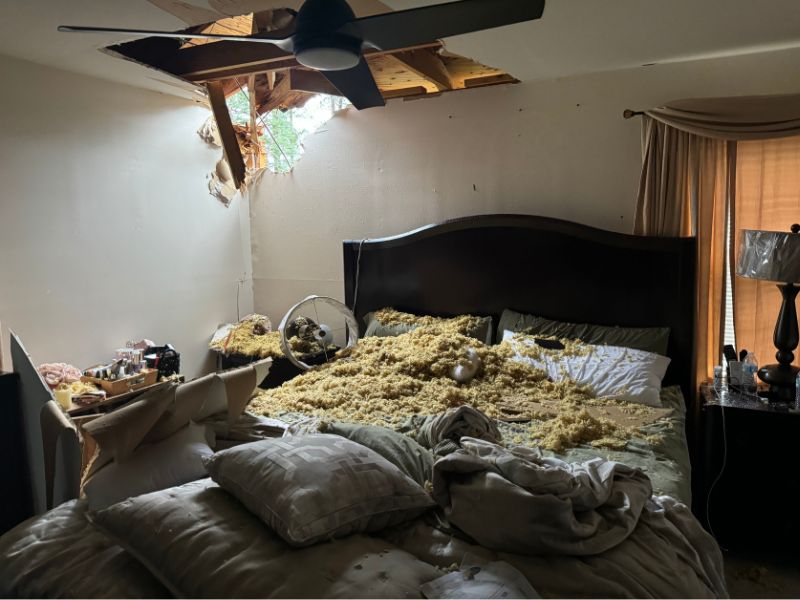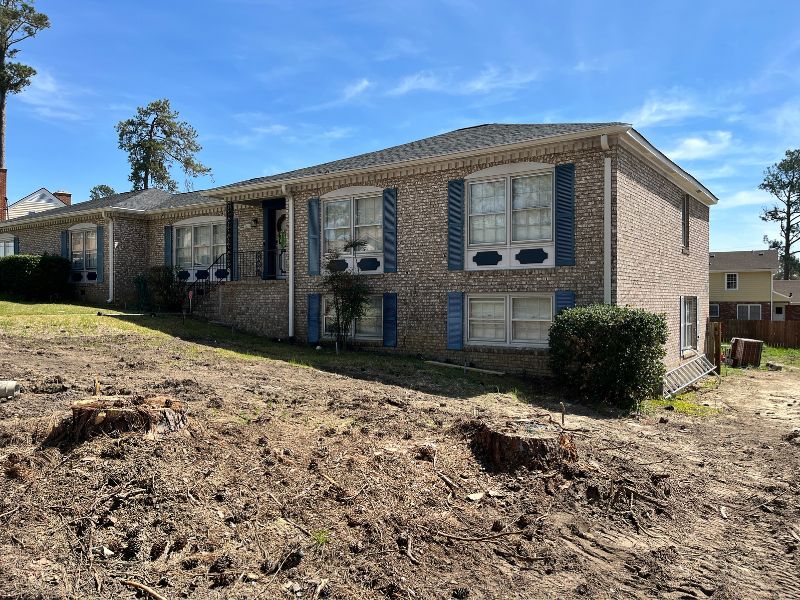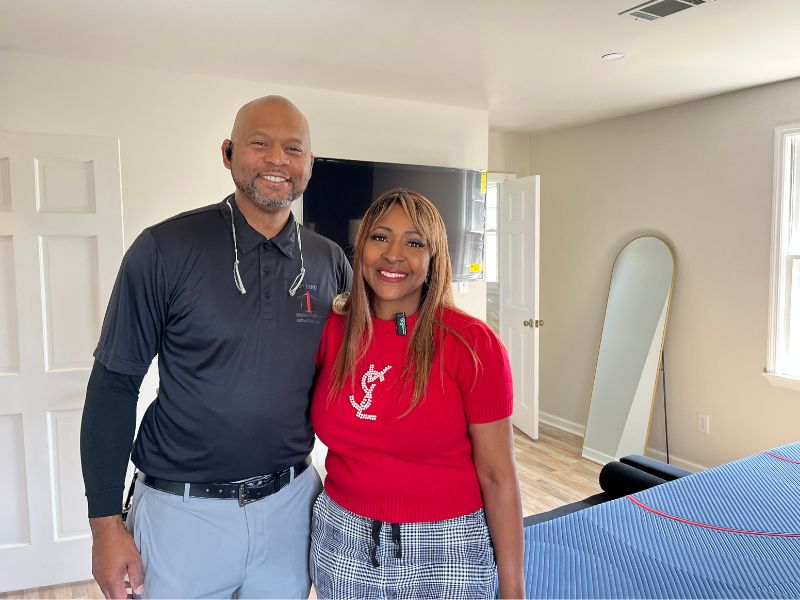By: Suzanne Lawler, Regional Communications Manager
Putting your life together after a disaster takes time, patience and help from strangers.
The Johnson family knows it all too well.
In September 2024, Hurricane Helene careened into the state of Georgia with a vengeance, splintering lives and upending families with its wrath. Corey and Shelita lay in their bed in Augusta, nervous and scared over the winds and rain. One tree crashed in the yard, and there was more to come. “The ceiling just kind of collapsed on me, so my husband had to get me out of the rubble, and my heart was pounding,” she said, recalling the next tree that smashed into their bedroom. “When it breached the brick, water started to come into the house as well. We’re just thankful that the water stopped that morning,” Corey recalled.

Corey and Shelita Johnson say help from the Red Cross meant a lot in the aftermath of Hurricane Helene.
“We are now on the receiving end for the first time in our lives,” said Corey.
The couple, covered in sticky yellow insulation, had to walk out of their Kingston subdivision to get Shelita to the hospital. She’s OK, but the ghosts of that night will haunt her forever. “I tell people I don't know if I caught PTSD (post-traumatic stress disorder) because of what I went through,” she said solemnly.
The American Red Cross launched a massive relief effort across the Southeast to help those impacted by Hurricane Helene. Staff and volunteers from all over the country poured into Georgia and the surrounding states, providing shelter, food, and comfort to people in areas severely hurt by the storm.
In addition to twisted metal and downed power lines, the damage was so severe in Augusta, the city had to shut off the water for a period of time. People stood in long gas lines, and huge swaths of the city didn’t have power.

Hurricane Helene uprooted a neighbor's tree, which fell into the bedroom of Corey and Shelita Johnson. Sticky yellow insulation rained down on the couple as the storm roared outside.

In the aftermath of Hurricane Helene, the Johnsons removed all the trees in their front yard.
In the immediate aftermath, Shelita found the Red Cross office and received financial assistance. It’s money that comes from generous donors to help households that have suffered major damage or destruction to their primary residence in a disaster-impacted area. “Well, it meant a lot because when you’re in a situation like that and you’re in despair and not knowing where your resources are going to come from, it’s hard to fathom how you’re going to start to rebuild and put your life back together,” Corey said.
“And I was blown out of the water, just the professionalism and the kind faces, everybody greeted me with a smile, even filling out the paperwork they were helpful on that, and it was seamless,” Shelita said.
Six months later, many residents in their subdivision still have tarps on their roofs, while piles of thick tree trunks dot the landscape and numerous construction vans are parked in front of homes. Corey and Shelita removed the eight remaining trees that were still standing on their land. “We’re out of harm's way unless lawn mowers start flying,” Corey chuckled.

Corey and Shelita Johnson in their new bedroom. Hurricane Helene destroyed the area when a tree burst through the ceiling in September of 2024.
The couple qualified for financial assistance from the American Red Cross and were able to fix their roof.
They can laugh about some aspects of this experience; it’s a coping mechanism after the worrisome experience they’ve had trying to secure the money and other resources to make their lives whole again. “Maybe six times, we heard ‘no’— ‘Based on income, you might make too much,’ or ‘Based on income, you make too little,’ or ‘You don’t have as many people in your household,’” Shelita explained. “I was under the impression that we’re going to have to go through savings, we’re going to have to go through and get loans to do this ourselves, because it didn’t seem like anyone was willing to help, but now, I’m team Red Cross!”
When resources allow, thanks to the generosity of donors, the Red Cross is able to provide some long-term recovery programs to support families in their recovery. The Johnsons qualified for additional financial assistance as part of the program. This round of assistance seeks to bridge the gap after the response phase and before community recovery programs may be in place. It provides direct financial assistance to families like the Johnsons whose homes were confirmed to have been destroyed or sustained major damage and who have ongoing recovery needs.
Corey served eight years as a county commissioner, he owns his own inspection and construction business. Shelita has a tax and payroll services company. They didn’t need financial assistance until Hurricane Helene brought heartbreak to their front door.
“It was surprising because I didn’t know about the second assistance until I received a text message,” she recalled. Shelita didn’t expect more from the humanitarian organization, so when that text came, it took her a week to open it up. “It said a deposit is on its way,” she said with tears in her eyes. “It was that easy, that simple, seamless, and I was overjoyed because it was still a constant battle with the insurance company. We needed to do the whole roof instead of a section of the roof because the shingles are over 10 years old. That second round of funding from the Red Cross was able to help us with the roof with the additional cost because the insurance company only paid for so much.”
“And to know there are resources in the community and the Red Cross to come and help you, know it means a lot,” Corey said. “We are now on the receiving end for the first time in our lives.”
“I tell you, when that text message came, and it was in the midst of all that chaos and going back and forth, that’s when I said, ‘nothing but God, nothing but God.’ And that was a relief on us because instead of us thinking it’s another hit on what we have to come out of pocket for something we didn’t have any control of, it was like everything is going to be all right,” Shelita reiterated.
The couple that’s been married 15 years figures that physically everything will be somewhat back to normal by early summer, just in time for another hurricane season. As for their immediate friends and neighbors, the timeline could take longer. “Over half the homes in this community were impacted,” she calculated. “Even with the community center, we are not able to use it at all,” she said somberly. “Something hit the power box, and that left out Christmas parties or community get-togethers or meetings to discuss things in our neighborhood. We don’t do that anymore; we meet at a neighbor's home.”
Life is and may always look different. Shelita and Corey donated to the Red Cross in the past. They say they’ll pick that back up once they get on their feet. And if anything happens in the future, Shelita says she knows what to do. “I’m team Red Cross. If you need any assistance, I know you all would be my first call.”
When an emergency happens, the Red Cross delivers help to whoever needs it, regardless of race, ethnicity, age, religion, sexual orientation, ability or citizenship status.
The second phase of the financial assistance program for Hurricane Helene and Hurricane Milton has now ended. If you still need assistance, please visit resources.redcross.org for additional resources that may be available to support your recovery.
Support all the urgent humanitarian needs of the American Red Cross.
Find a drive and schedule a blood donation appointment today.
Your time and talent can make a real difference in people’s lives. Discover the role that's right for you and join us today!